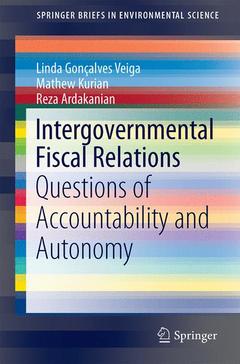Intergovernmental Fiscal Relations, 2015 Questions of Accountability and Autonomy SpringerBriefs in Environmental Science Series

This book examines and analyzes issues related to public finance in subnational governments, along with a discussion of case studies on decentralization. Most of the analysis applies to all public goods and services provided by subnational governments, with some placed on the role of subnational governments in the management of environmental resources, notably water and waste
Coverage includes optimal arrangements for sharing fiscal responsibilities among different levels of government, the potential impact of decentralization on the quality of public goods delivery, local governments? expenditure and revenue choices, and the effect of decentralization on accountability, governance and policy outcomes. The scope of discussion extends to both public finance theory and applied policy debates.
The first chapter, on trends in financing of public services, opens with an explanation of the how and why of government intervention in the economy, the nature and purposes of transfers between and among governments and trends in decentralization. Case studies examine the impact of decentralization in such areas as service delivery, water and sanitation, education and health, and on poverty and income inequality.
Chapter 2 examines public budgets: governance structures, norms and organizational practices, building up understanding of budgets, budget cycles, fiscal revenues from fees and taxes, expenses, debt and political economy issues, rules mandating balanced budgets in government and more.
Chapter 3 discusses issues of accountability and policy outcomes, offering important lessons from recent international experience, including ways to strengthen political, administrative and financial accountability. The concluding chapter recounts lessons from recent international experience and surveys implications for the nexus approach to management of environmental resources.
The information, analysis and expert advice presented here is particularly relevant for developing and emerging countries, where well designed decentralization reforms have a higher potential to improve efficiency in the provision of public services, and to enhance the development of integrated and sustainable strategies for the use of water, soil and waste resources and applications that advance the nexus approach.
Dr. Mathew Kurian is Academic Officer and leads the Capacity Development and Governance unit at United Nations University Institute for Integrated Management of Material Fluxes and of Resources (UNU-FLORES). Prior to joining UNU-FLORES, he served as Senior Water and Sanitation Specialist at Water and Sanitation Programme (WSP) of The World Bank where he led policy advocacy efforts related to rural water supply, wastewater reuse, and climate adaptation options in secondary towns. He began his career as a Robert McNamara Fellow at the World Bank where his work on land tenure reform was hosted by the Tata Energy Research Institute (TERI), New Delhi.
Upon completing his PhD in Development Studies from the Institute of Social Studies (ISS), Erasmus University, The Hague, Netherlands, Dr. Kurian was employed as Associate Expert (Dutch Ministry of Foreign Affairs) at International Water Management Institute (IWMI-CGIAR) where he undertook as
Date de parution : 08-2014
Ouvrage de 69 p.
15.5x23.5 cm
